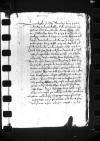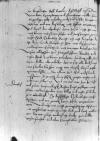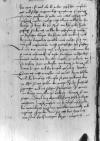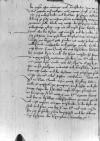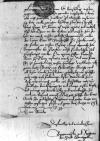Es hot sich Ewer Genode aws genedigem willen / und zugethanem gemute kegen uns / und dys sein ⌊vaterlandt⌋ / ye / und allewege / in unsern anligenden sachen / durch hulffe / gut(en) rath / beystande und furderunge / in allen genaden ertzeiget, / welchs noch Ewer Genode / diser gutt(en) stadt / und seynem vaterlande zcu best(en) nicht zu achterlossen / uberbotig gewesen, wie sulch genedig erbitt(en) unser vilgelibt(en) raets geschickt(en). / So beÿ Ewer Genod(en) / in beygewichenen ⌊tagefart(en)⌋ / in ⌊disen landen⌋ gehalten / gewesen / in irer heimkunft / uns mith breiterm / und besunderm fleise angetrag(en) / und tzu erkennen gegeben, / das wyr um(m)be Ewer Genode mith unsterblicher dangksagunge / alleczeit / geflissen sein wollen / zcu vordynen / konnen d(er)wegen / aws vorhafftem Ewer Genod(en) / genedig(en) [...] text damaged⌈[...][...] text damaged⌉ erbitt(en) / unser / und unser stadth gemeyn / und sunderlich obligen / Ewer G(enode)n dinstlichen nicht bergen, / das in disen tagen ⌊Hans Holsten⌋, / unser burger, / ein mensch / zcu vordriess / und aller newickeit vo(n) natur geboren, / wellende sich mit gantzem newenn freuelichen vorsatz kegen uns, / unser autoritet / unde gericht setcz(e)n und strengen / unsern gehorsam entgehen etc. Sich  BCz, 1624, p. 72 an koniglichen hoff bogeben / doselbigst etzliche bryve, mandata, / exemptiones / und avocationes / widder seinen burgerlichen eydth / erhalten / und seine milden berichten [...] hidden by binding⌈[...][...] hidden by binding⌉ bekomen / und uns dieselbig(en) mith hoffart vorgetrag(en) und dweil dan obgedocht(en) ⌊Hans Holste⌋ nicht hot mogen noch konnen / mit seinem stifen / und hartsynnigem gemuthe unser stadt ordentlich gericht / och nicht ⌊koniglicher rethe diser lande Prewsen⌋ / so ihme was boschwerlichs widderfaren / erkenthnus / noch vormogen ⌊koniglicher ma(iesta)t⌋ unsers all(er)g(nedi)gsten hern hintergelossenen statuten / unde unser stadt wylkoeren / erhaltenen freiheit(en) unde privilegien / dulden ader erleiden / hot er sich / alle der gerichte, was standes die szein mog(en) / vom cleinst(en) / bis zcu grosten eximiren lossen. /
BCz, 1624, p. 72 an koniglichen hoff bogeben / doselbigst etzliche bryve, mandata, / exemptiones / und avocationes / widder seinen burgerlichen eydth / erhalten / und seine milden berichten [...] hidden by binding⌈[...][...] hidden by binding⌉ bekomen / und uns dieselbig(en) mith hoffart vorgetrag(en) und dweil dan obgedocht(en) ⌊Hans Holste⌋ nicht hot mogen noch konnen / mit seinem stifen / und hartsynnigem gemuthe unser stadt ordentlich gericht / och nicht ⌊koniglicher rethe diser lande Prewsen⌋ / so ihme was boschwerlichs widderfaren / erkenthnus / noch vormogen ⌊koniglicher ma(iesta)t⌋ unsers all(er)g(nedi)gsten hern hintergelossenen statuten / unde unser stadt wylkoeren / erhaltenen freiheit(en) unde privilegien / dulden ader erleiden / hot er sich / alle der gerichte, was standes die szein mog(en) / vom cleinst(en) / bis zcu grosten eximiren lossen. /
Das alleine ⌊ko(niglich)e ma(iesta)t⌋ und seine comissarien in gemelt(en) ⌊Hans Holst(en)⌋ / sachen richten und erkennen sollen etc. / und wiewol wyr irer ⌊ko(nigliche)n ma(iesta)t⌋ und seiner hochwirdigste(en) rehten / decrett on the margin⌈decrettdecrett on the margin⌉ / nicht geflogen, / noch flihen wellen / sunder was billig und recht / zu leiden seint uberbotigk. / So dasselbige ordentlicher weise bescheen / und von gemelt(en) ⌊Hans Holsten⌋ / vorgenom(m)en were / und muss uns / nicht geringschetzigen boschwe(re) mit vorszerunge unser gemuthe / leib / und hertz / einbrengen, / das uns / sulche vordrisliche burden / zcu widder unser freiheit / und alter gerechtickeit / zcu welche illegible⌈[lche]lche illegible⌉  BCz, 1624, p. 73 der eyne / so wol als d(er) ander gesessen awferleget / und sulche / ungewonliche exemptiones / so gering(en) privaten personen / zu gutte / ane mittel vorligen und awsgeg(en) werden / welchs nicht alleine / widder die orderunge, / so durch / die ⌊ko(niglich)e ma(iesta)t⌋ / vor dise gutte ⌊stadt⌋ gesatczt. / Sunder och / widder den gehorsam / zu welche(n) ein itczlicher burger / bey seinem eyde vorbund(en) / und die gantze burgerliche eynickeit, / aws welcher sich nÿma(n)ts sall awssmittelen / nicht geringlichen thut fechten / und mus uns werlich weh / und schwer ankommen, / das so weinig aufmerck(en) / uf unser privilegia / und stadth freiheit / welche uns thewrbar angekom(m)en / und aws unser vorfarn hogen vordinsten / von kon(n)ig(en) zu kon(n)ig(en) / allewege in ehren / und bey krafft gehalten gegeben. / Konnen och nicht ermessen, / wie gena(n)t(er) ⌊Hans Holsten⌋ um(m)be die ⌊konigliche maiestet⌋ / so gros vordienet, / das ire ma(iesta)t seinent halben / der gantzen stadth freiheitt schwechen / und mit sulchen prerogativen / zu gemeyner kurtze / uns allen tzu vordries / bewog(en) zu vorsorgen. /
BCz, 1624, p. 73 der eyne / so wol als d(er) ander gesessen awferleget / und sulche / ungewonliche exemptiones / so gering(en) privaten personen / zu gutte / ane mittel vorligen und awsgeg(en) werden / welchs nicht alleine / widder die orderunge, / so durch / die ⌊ko(niglich)e ma(iesta)t⌋ / vor dise gutte ⌊stadt⌋ gesatczt. / Sunder och / widder den gehorsam / zu welche(n) ein itczlicher burger / bey seinem eyde vorbund(en) / und die gantze burgerliche eynickeit, / aws welcher sich nÿma(n)ts sall awssmittelen / nicht geringlichen thut fechten / und mus uns werlich weh / und schwer ankommen, / das so weinig aufmerck(en) / uf unser privilegia / und stadth freiheit / welche uns thewrbar angekom(m)en / und aws unser vorfarn hogen vordinsten / von kon(n)ig(en) zu kon(n)ig(en) / allewege in ehren / und bey krafft gehalten gegeben. / Konnen och nicht ermessen, / wie gena(n)t(er) ⌊Hans Holsten⌋ um(m)be die ⌊konigliche maiestet⌋ / so gros vordienet, / das ire ma(iesta)t seinent halben / der gantzen stadth freiheitt schwechen / und mit sulchen prerogativen / zu gemeyner kurtze / uns allen tzu vordries / bewog(en) zu vorsorgen. /
Dweil dach obgemel(ter) ⌊Hans Holst(en)⌋ / in beygewichenem jungst(en) awfrur / ein heimlich(er) anschunder der vorruckunge burglicher eynickeit / vormerckt und erspuret ist worden, / wie sich noch dys thegelich aws seine halstarrigem koppe / erogeth  BCz, 1624, p. 74 der unser ehre / autoritet / und iurisdiction / uns von ⌊ko(nigliche)r hidden by binding⌈[o(nigliche)r]o(nigliche)r hidden by binding⌉ ma(iesta)t⌋ gegeben und vorligen / mith eigener turst(?) / zu benehmen sich understanden / und darkegen zu setczen beflissen. Dodurch / so sulch vornehmen / seinen unvorruckt(en) vortgangen gewynnem sulde / kunde noch mochte / der gehorsam / unde die underthenige pflicht / nicht ane all unser faer / behalt(en) we[...] hidden by binding⌈[...][...] hidden by binding⌉.
BCz, 1624, p. 74 der unser ehre / autoritet / und iurisdiction / uns von ⌊ko(nigliche)r hidden by binding⌈[o(nigliche)r]o(nigliche)r hidden by binding⌉ ma(iesta)t⌋ gegeben und vorligen / mith eigener turst(?) / zu benehmen sich understanden / und darkegen zu setczen beflissen. Dodurch / so sulch vornehmen / seinen unvorruckt(en) vortgangen gewynnem sulde / kunde noch mochte / der gehorsam / unde die underthenige pflicht / nicht ane all unser faer / behalt(en) we[...] hidden by binding⌈[...][...] hidden by binding⌉.
Domit aber dis boswer / nicht einrisse / und den andern, / die sich sulcheins ires gefallens / kunftig(er) tage / anmoszen mucht(en) / ein beÿspil gebe / sunder mit raeth / zcutaet / und widd(er)stande / awfgehaben und getilget wurde / habe [...] hidden by binding⌈[...][...] hidden by binding⌉ nicht konnen Ewer Genod(en) / als eine besunderm liebhaber der freiheit ⌊diser lande⌋ / dis thuent / wissen tzu bergen in ungeczweifelt(en) vortrawen seinde / Ewer G(enod)e als ein mit hewpt diser lande / wirt ⌊ko(nigliche)r ma(iesta)t⌋ u(nser) a(ller)g(nedig)st(en) hern ehre / unser vorligene autoritett und iurisdiction / in genediger acht haben / und dys boschwer / mit gunstiger furderunge / bey ko(nigliche)r ma(iesta)t helffen wandelenn. /
Deme noch ist an Ewer Genode / unser gantz dinstlich bitten wolle / zu awfhebunge gemeynen vordrisses / unde stoppunge / kegen die obrickeit / unfridlichen furnehmens an ⌊konigliche ma(iesta)t⌋ / aws Ewer G(enode)n eigenem bewach / und das es diselbige / aws schalbarm gemeyne(n) geruchte und nicht unserm anregen vorstanden / in der besten gestalt und form, / wie das Ewer G(enod)e / wol wirt wissen bey sich zu finden / seine vorschrifft / und dys bedrenglich boschwer / der exemption, / avocation etc. ... illegible⌈...... illegible⌉  BCz, 1624, p. 75 gelangen / und so Ewer G(enod)e demselbig(en) unserm guthmenig(en) ansynnen / in genaden nochzugeben / (doran wir nicht zcweifeln) willens ist abermols / unser emsig bitt(en) / wolle geruchen / diselbige seine vorschrifft durch Ewer G(enode)n diener / uf unser expens und unkost(en) biss ken ⌊Thorn⌋ / an den erbarn und weisen hern ⌊Johan von Werd(en)⌋ / unsern geliebt(en) burgermeist(er) / neben der copien Ewer G(enode)n vorschrifft / zcu schicken / welche fordan an unsern gesant(en) / durch obgemelt(en) hern burgermeister / ken ⌊Petrkow⌋ / awfs furderlichste / sal zugefertiget werden. / Die expens sollen / Ewer G(enode)n / diener zu ⌊Thorn⌋ erstattet werd(en) etc. / und was Ewer G(enod)e zu hanthabunge unser freiheyt, / wylkoeren, / alt(en) gewonheit(en), / statut(en), / och ordentlichen gerichts / und all ⌊diser lande⌋ iurisdiction / genediglich mit hulffe / gut(en) rathe / und furderunge / disem ⌊vaterlande⌋ / zcum best(en) / wirt anwend(en). /
BCz, 1624, p. 75 gelangen / und so Ewer G(enod)e demselbig(en) unserm guthmenig(en) ansynnen / in genaden nochzugeben / (doran wir nicht zcweifeln) willens ist abermols / unser emsig bitt(en) / wolle geruchen / diselbige seine vorschrifft durch Ewer G(enode)n diener / uf unser expens und unkost(en) biss ken ⌊Thorn⌋ / an den erbarn und weisen hern ⌊Johan von Werd(en)⌋ / unsern geliebt(en) burgermeist(er) / neben der copien Ewer G(enode)n vorschrifft / zcu schicken / welche fordan an unsern gesant(en) / durch obgemelt(en) hern burgermeister / ken ⌊Petrkow⌋ / awfs furderlichste / sal zugefertiget werden. / Die expens sollen / Ewer G(enode)n / diener zu ⌊Thorn⌋ erstattet werd(en) etc. / und was Ewer G(enod)e zu hanthabunge unser freiheyt, / wylkoeren, / alt(en) gewonheit(en), / statut(en), / och ordentlichen gerichts / und all ⌊diser lande⌋ iurisdiction / genediglich mit hulffe / gut(en) rathe / und furderunge / disem ⌊vaterlande⌋ / zcum best(en) / wirt anwend(en). /
Wollen wir dasselbige / mith unsterblicher dancksagunge / ye und alwege / unsern kreft(en) und vormog(en) noch / boreidtwillig und unvordrossen / zcu vordinen / befund(en) werd(en) / mith Got(es) hulffe / der Ewer Genode / in gelugselig(en) regiment / und gutter langer vorhoffter gesuntheit / friste / und spare. /
 BCz, 1624, p. 72 an koniglichen hoff bogeben / doselbigst etzliche bryve, mandata, / exemptiones / und avocationes / widder seinen burgerlichen eydth / erhalten / und seine milden berichten [...] hidden by binding⌈[...][...] hidden by binding⌉ bekomen / und uns dieselbig(en) mith hoffart vorgetrag(en) und dweil dan obgedocht(en)
BCz, 1624, p. 72 an koniglichen hoff bogeben / doselbigst etzliche bryve, mandata, / exemptiones / und avocationes / widder seinen burgerlichen eydth / erhalten / und seine milden berichten [...] hidden by binding⌈[...][...] hidden by binding⌉ bekomen / und uns dieselbig(en) mith hoffart vorgetrag(en) und dweil dan obgedocht(en)  BCz, 1624, p. 73 der eyne / so wol als d(er) ander gesessen awferleget / und sulche / ungewonliche exemptiones / so gering(en) privaten personen / zu gutte / ane mittel vorligen und awsgeg(en) werden / welchs nicht alleine / widder die orderunge, / so durch / die
BCz, 1624, p. 73 der eyne / so wol als d(er) ander gesessen awferleget / und sulche / ungewonliche exemptiones / so gering(en) privaten personen / zu gutte / ane mittel vorligen und awsgeg(en) werden / welchs nicht alleine / widder die orderunge, / so durch / die  BCz, 1624, p. 74 der unser ehre / autoritet / und iurisdiction / uns von
BCz, 1624, p. 74 der unser ehre / autoritet / und iurisdiction / uns von  BCz, 1624, p. 75 gelangen / und so Ewer G(enod)e demselbig(en) unserm guthmenig(en) ansynnen / in genaden nochzugeben / (doran wir nicht zcweifeln) willens ist abermols / unser emsig bitt(en) / wolle geruchen / diselbige seine vorschrifft durch Ewer G(enode)n diener / uf unser expens und unkost(en) biss ken
BCz, 1624, p. 75 gelangen / und so Ewer G(enod)e demselbig(en) unserm guthmenig(en) ansynnen / in genaden nochzugeben / (doran wir nicht zcweifeln) willens ist abermols / unser emsig bitt(en) / wolle geruchen / diselbige seine vorschrifft durch Ewer G(enode)n diener / uf unser expens und unkost(en) biss ken 